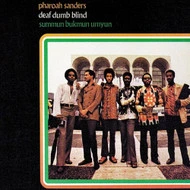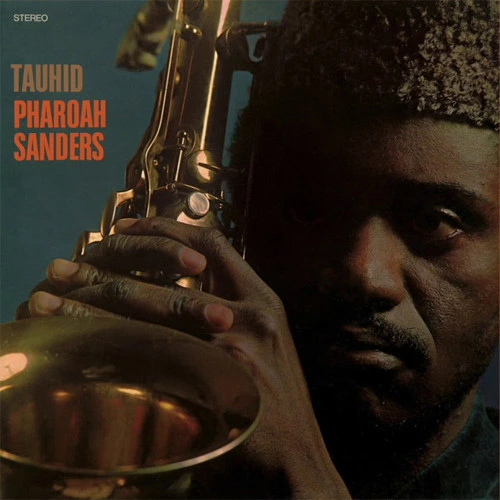Out of Print! Only 1 copy available!
A Spiritual Journey On Vinyl LP!
Featuring Gary Bartz, Woody Shaw, Lonnie Liston Smith & More!
Pharoah Sanders possesses one of the most distinctive tenor saxophone sounds in jazz. Harmonically rich and heavy with overtones, Sanders' sound can be as raw and abrasive as it is possible for a saxophonist to produce. Yet, Sanders is highly regarded to the point of reverence by a great many jazz fans. He made his name with expressionistic, nearly anarchic free jazz in John Coltrane's late ensembles of the mid-'60s. The hallmarks of Sanders' playing at that time were naked aggression and unrestrained passion. In the years after Coltrane's death, however, Sanders explored other, somewhat gentler and perhaps more cerebral avenues without, it should be added, sacrificing any of the intensity that defined his work as an apprentice to Coltrane.
Coltrane's ensembles with Sanders were some of the most controversial in the history of jazz. Their music represents a near total desertion of traditional jazz concepts, like swing and functional harmony, in favor of a teeming, irregularly structured, organic mixture of sound for sounds sake. Strength was a necessity in that band, and as Coltrane realized, Sanders had it in abundance.
Sanders made his first record as a leader in 1964. Deaf, Dumb, Blind (Summun, Bukmun, Umyun) was recorded at A & R Studios in New York City on July 1, 1970, and released on Impulse Records in the same year. The album's title is bilingual: "Summun Bukmun Umyun" is Arabic for "Deaf Dumb Blind". The phrase s taken from the Sura Bakara of the Qur'an. According to the liner notes, the album is "predicated on spiritual truths and to the future enlightenment of El Kafirun or The Rejectors of Faith (non-believers)". The performances on the album are strongly influenced by the music of Africa.
"After Karma was issued and Sanders had established himself -- to himself -- as a musician who had something valuable and of use to say, he was on what this critic considers to be a divinely inspired tear. Deaf Dumb Blind is an example of that inspiration. Beginning with the title cut, a suite of over 21 minutes, Sanders brings in the whole of his obsession with rhythm and R&B. Using African percussion, bylophones, shakers, cowbells, and all manner of percussion, as well as drummer Clifford Jarvis, Sanders brought in Cecil McBee to hold down the bass chair and Lonnie Liston Smith back in on piano, and added a three-piece horn section that included Gary Bartz on alto and Woody Shaw on trumpet in addition to himself. Whew! Here the Latin and African polyrhythms collide and place the horns, as large and varied as they are, in almost a supplementary role. The horns check counterpoint in striated harmony, calling and responding over the wash of bass and drums and drums and drums! It evolves into a percussion orgy before the scary otherworldly multiphonic solos begin. And Shaw and Bartz are worthy foils for Sanders. And no matter how out it gets, those rhythms keep it rooted in the soul. 'Let Us Go Into the House of the Lord' is almost 18 minutes in length. It has a long soprano intro, covered in shimmering bells and shakers with a glorious piano fill by Smith, who becomes more prominent, along with some excellent arco work by McBee, until the piece becomes a meditation on lyricism and silence about halfway through. The entire band eventually rejoins for a group ostinato with very little variation, except in timbre and subtle accented color work by Sanders and McBee. It is a stunningly beautiful and contemplative work that showcases how intrinsic melodic phrasing and drones were to Sanders at the time -- and still are today. This piece, and this album, is a joyful noise made in the direction of the divine, and we can feel it through the speakers, down in the place that scares us." - Thom Jurek, allmusic.com
Features:
Vinyl LP
Musicians:
Pharoah Sanders, soprano saxophone, cow horn, bells, tritone whistle, cowbells, wood flute, thumb piano, percussion
Woody Shaw, trumpet, maracas, yodeling, percussion
Gary Bartz, alto saxophone, bells, cowbell, shakers, percussion
Lonnie Liston Smith, piano, cowbell, thumb piano, percussion
Cecil McBee, bass
Clifford Jarvis, drums
Nathaniel Bettis, bylophone, yodeling, African percussion
Anthony Wiles, conga drum and African percussion
Selections:
1. Summun, Bukmun, Umyun
2. Let Us Go Into The House Of The Lord
A Spiritual Journey On Vinyl LP!
Featuring Gary Bartz, Woody Shaw, Lonnie Liston Smith & More!
Pharoah Sanders possesses one of the most distinctive tenor saxophone sounds in jazz. Harmonically rich and heavy with overtones, Sanders' sound can be as raw and abrasive as it is possible for a saxophonist to produce. Yet, Sanders is highly regarded to the point of reverence by a great many jazz fans. He made his name with expressionistic, nearly anarchic free jazz in John Coltrane's late ensembles of the mid-'60s. The hallmarks of Sanders' playing at that time were naked aggression and unrestrained passion. In the years after Coltrane's death, however, Sanders explored other, somewhat gentler and perhaps more cerebral avenues without, it should be added, sacrificing any of the intensity that defined his work as an apprentice to Coltrane.
Coltrane's ensembles with Sanders were some of the most controversial in the history of jazz. Their music represents a near total desertion of traditional jazz concepts, like swing and functional harmony, in favor of a teeming, irregularly structured, organic mixture of sound for sounds sake. Strength was a necessity in that band, and as Coltrane realized, Sanders had it in abundance.
Sanders made his first record as a leader in 1964. Deaf, Dumb, Blind (Summun, Bukmun, Umyun) was recorded at A & R Studios in New York City on July 1, 1970, and released on Impulse Records in the same year. The album's title is bilingual: "Summun Bukmun Umyun" is Arabic for "Deaf Dumb Blind". The phrase s taken from the Sura Bakara of the Qur'an. According to the liner notes, the album is "predicated on spiritual truths and to the future enlightenment of El Kafirun or The Rejectors of Faith (non-believers)". The performances on the album are strongly influenced by the music of Africa.
"After Karma was issued and Sanders had established himself -- to himself -- as a musician who had something valuable and of use to say, he was on what this critic considers to be a divinely inspired tear. Deaf Dumb Blind is an example of that inspiration. Beginning with the title cut, a suite of over 21 minutes, Sanders brings in the whole of his obsession with rhythm and R&B. Using African percussion, bylophones, shakers, cowbells, and all manner of percussion, as well as drummer Clifford Jarvis, Sanders brought in Cecil McBee to hold down the bass chair and Lonnie Liston Smith back in on piano, and added a three-piece horn section that included Gary Bartz on alto and Woody Shaw on trumpet in addition to himself. Whew! Here the Latin and African polyrhythms collide and place the horns, as large and varied as they are, in almost a supplementary role. The horns check counterpoint in striated harmony, calling and responding over the wash of bass and drums and drums and drums! It evolves into a percussion orgy before the scary otherworldly multiphonic solos begin. And Shaw and Bartz are worthy foils for Sanders. And no matter how out it gets, those rhythms keep it rooted in the soul. 'Let Us Go Into the House of the Lord' is almost 18 minutes in length. It has a long soprano intro, covered in shimmering bells and shakers with a glorious piano fill by Smith, who becomes more prominent, along with some excellent arco work by McBee, until the piece becomes a meditation on lyricism and silence about halfway through. The entire band eventually rejoins for a group ostinato with very little variation, except in timbre and subtle accented color work by Sanders and McBee. It is a stunningly beautiful and contemplative work that showcases how intrinsic melodic phrasing and drones were to Sanders at the time -- and still are today. This piece, and this album, is a joyful noise made in the direction of the divine, and we can feel it through the speakers, down in the place that scares us." - Thom Jurek, allmusic.com
Features:
Vinyl LP
Musicians:
Pharoah Sanders, soprano saxophone, cow horn, bells, tritone whistle, cowbells, wood flute, thumb piano, percussion
Woody Shaw, trumpet, maracas, yodeling, percussion
Gary Bartz, alto saxophone, bells, cowbell, shakers, percussion
Lonnie Liston Smith, piano, cowbell, thumb piano, percussion
Cecil McBee, bass
Clifford Jarvis, drums
Nathaniel Bettis, bylophone, yodeling, African percussion
Anthony Wiles, conga drum and African percussion
Selections:
1. Summun, Bukmun, Umyun
2. Let Us Go Into The House Of The Lord




 Turntable Accessories
Turntable Accessories Headphone Accessories
Headphone Accessories Cable Accessories
Cable Accessories Vinyl Accessories
Vinyl Accessories Compact Disc Accessories
Compact Disc Accessories







